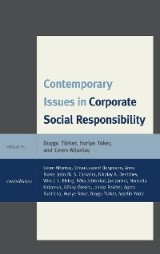Details

Contemporary Issues in Corporate Social Responsibility
|
48,99 € |
|
| Verlag: | Lexington Books |
| Format: | EPUB |
| Veröffentl.: | 18.12.2013 |
| ISBN/EAN: | 9780739183748 |
| Sprache: | englisch |
| Anzahl Seiten: | 204 |
DRM-geschütztes eBook, Sie benötigen z.B. Adobe Digital Editions und eine Adobe ID zum Lesen.
Beschreibungen
<span><span>As a result of the industrialization, urbanization, and population increase during the last two centuries, the global landscape has been irreversibly damaged. These anthropological pressures have create endless problems on the global level, and individuals and organizations are beginning to realize their own ever-increasing responsibility to consider the welfare and interests of all stakeholders as a whole. Although the improvements in the legal framework at the national and international level can be viewed as an important step to protect society and the natural environment, a legal course provides a reactive mode of control rather than a proactive approach. Considering its proactive approach and voluntarily basis, the concept of social responsibility can provide a significant tool of generating a sustainable future. <br><br>During such a paradigm shift, </span><span>Contemporary Issues in Corporate Social Responsibility</span><span> presents the significant roles that universities must embrace in order to take charge of the future. In parallel to those movements, many institutions include a course on social responsibility, yet the studies on the education of social responsibility in the literature show that there is no commonly accepted teaching methods and guiding curriculum of CSR. This book was designed based on the outcomes of an Erasmus Intensive Project (IP) which was organized in Yasar University during June 2012 with the contribution of 9 European universities. Based on the interactive feedback of participants during the project, this book sheds light on the ongoing discussion of corporate social responsibility from a European perspective.<br></span></span>
<br>
<span></span>
<br>
<span></span>
<span><span>Contemporary Issues in Corporate Social Responsibility</span><span> presents the significant roles that universities must embrace in order to reverse the damage wrought by two centuries of urbanization, industrialization, and population increase. While many institutions include a course on social responsibility, studies on the education of social responsibility show that there are no commonly accepted teaching methods or guiding curriculum of corporate social responsibility. This book brings together a common sense of understanding about CSR teaching of European universities. Based on the accumulated knowledge and experience of a European project with 9 partner universities, the book contributes to the ongoing discussion of contemporary issues in CSR. <br></span></span>
<br>
<span></span>
<br>
<span></span>
<span><span>List of Figures and Tables <br>Preface<br><br>Chapter 1: What’s in a Word?<br></span><span>João M. S. Carvalho, Jan Jonker, and Nikolay A. Dentchev</span><span><br><br>Chapter 2: Corporate Governance and Stakeholder Management <br></span><span>Anne Burke </span><span><br><br>Chapter 3: Corporate Social Responsibility in European Context <br></span><span>Ayselin Yildiz, Gokay Ozerim</span><span><br><br>Chapter 4: Communicating Corporate Social Responsibility in a Specific World <br></span><span>Wim Elving </span><span><br><br>Chapter 5: Management System Standards and Other Initiatives for CSR <br></span><span>Agata Rudnicka and Janusz Reichel </span><span><br><br>Chapter 6: Sustainable Supply Chain Management <br></span><span>Ceren Altuntas</span><span><br><br>Chapter 7: Sustainability of CSR Projects in Times of Economic Crises<br></span><span>Elmar-Laurent Borgmann and Nadezda Kokareva</span><span><br><br>Chapter 8: The Role of Non-Governmental Organizations in CSR <br></span><span>Huriye Toker</span><span><br><br>Chapter 9: Communicating Corporate Social Responsibility <br></span><span>Réka Jablonkai</span><span><br><br>Chapter 10: Developing a Social Responsibility Strategy <br></span><span>Duygu Türker</span><span><br><br>Bibliography<br>Index<br>About the Authors </span></span>
<br>
<span></span>
<br>
<span></span>
<span><span><br></span><span>Duygu Türker</span><span> is assistant professor in the Department of Business Administration at Yasar University. She was previously a guest researcher at the University of Oslo with the support of the Research Council of Norway. <br><br></span><span>Ceren Altuntas</span><span> is a PhD student in the Department of Business Administration at Dokuz Eylul University. She is also a lecturer at Yasar University. <br><br></span><span>Huriye Toker</span><span> is an assistant professor in the Department of Communication at Yasar University. She has administrative and research experience on many national and international projects. <br><br></span></span>

















